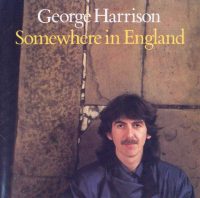
Recorded: March – October 1980; November 1980 – February 1981
Producers: George Harrison, Ray Cooper
Released: 1 June 1981 (US), 5 June 1981 (UK)
Available on:
Somewhere In England
Personnel
George Harrison: vocals, electric guitar
Mike Moran: keyboards
Herbie Flowers: bass guitar
Dave Mattacks: drums, percussion
‘Blood From A Clone’ is the opening song on George Harrison’s ninth solo album Somewhere In England.
The album was the first by a former Beatle to be rejected by a record company. Warner Bros decided Somewhere In England was not commercial enough, and asked Harrison to rework it.
I think he felt sidelined by everything that was going on. It was the rise of the machine, and there was a real sea change in popular music. Soft Cell, Depeche Mode, he felt that was all at the opposite end of the spectrum and he was railing against it. I don’t think he was disillusioned, I just think he was sad about what was going on around him. ‘What am I doing? I don’t feel a part of contemporary music.’ The lyric [of ‘Blood From A Clone’] was basically anti-machine, anti-manufactured pop star song.
Behind The Locked Door, Graeme Thomson
To placate the label, Harrison dusted down ‘All Those Years Ago’, changing the lyrics in the wake of Lennon’s assassination. He also recorded the new songs ‘Teardrops’, ‘That Which I Have Lost’, and ‘Blood From A Clone’ – a withering critique of Warners.
Once, at the time I was at Warner Bros. and I wrote that song ‘Blood From A Clone’, that was when they were having all these surveys out on the street to find out what was a hit record. And apparently, as I was told, a hit record is something that is about ‘love gained or lost between 14- and 19-year-olds,’ or something really dumb like that.
Billboard, December 2000
That was all this stuff they were telling me: ‘Well, we like it, but we don’t really hear a single.’ And then other people were saying, ‘now, look, radio stations are having all these polls done in the street to find out what constitutes a hit single and they’ve decided a hit single is a song of love gained or lost directed at 14-to-20-year-olds.’ And I said, ‘S**t, what chance does that give me?’ So anyway, I went in and wrote that song just to shed some of the frustrations. And there’s things in there like ‘There is no sense to it, pure pounds and pence to it… They’re so intense, too, makes me amazed.’
Creem, December 1987
Harrison worked on ‘Blood From A Clone’ on 9 December 1980, the day news broke about the death of John Lennon.
Ray [Cooper, co-producer] called on the morning of the sessions and said, ‘I’m not sure whether it’s going to happen.’ I asked why. ‘Have you not heard? John Lennon has been shot.’ There was a two- or three-hour gap when nothing happened, then Ray called back and the conversation was something along the lines of, ‘I’ve spoken to George, and he thinks that trying to make music would be more therapeutic than him sitting around and being besieged by press and God knows what else.’ So the session went ahead.Ray picked me up at the railway station, and we got to Friar Park and the gates outside were mobbed with press. It got a little bit more serene when we got to the house. I just said, ‘I’m incredibly sorry about the news. Me and half the world are lost for words.’ After a while, the session got underway. I was overdubbing a track called ‘Blood From A Clone’. I was trying to do something a little off-centre, because that’s what the lyrics of the song implied, it was an anti-drum-machine song. I remember thinking, ‘Try and programme this!’ Initially George wasn’t 100 per cent sure, but Ray convinced him. It wasn’t heated, it was just a discussion between the three of us, and he came around to it. After we’d recorded, in the evening we sat around eating. The conversation got around, very gently, to the crazy fan factor. We talked for a bit about Beatlemania and all that, and then George said, ‘All I really wanted to do was to be in a band.’ It was very telling, and very poignant. In other words, ‘All these side issues got in the way, and look where it got us. This is the end result.’
Uncut, May 2020

